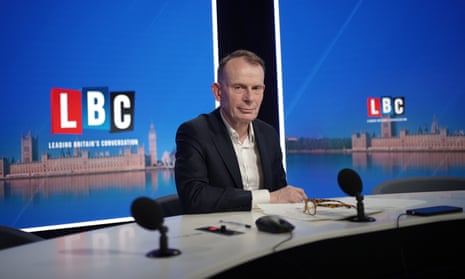Ten weeks after ending his 16-year BBC One Sunday TV show with the words, “You stay classy, San Diego” – the sign-off of caricature presenter Ron Burgundy in the movie Anchorman – Andrew Marr signed on to his new show on LBC by hailing “a day of horror in Ukraine and growing unease here in Britain.”
Anchorman fans will recall that Burgundy is fooled into reading a banned profanity from his autocue, and Marr’s publicity interviews might have led us to believe that he planned to deliberately hurl expletives at his LBC audience. The show, he promised, would “ruffle feathers”; he had left the BBC to “get his voice back” and “speak his mind.”
In fact – as with Eddie Mair, an earlier LBC marquee signing from Britain’s oldest wireless broadcaster – the move so far proves that it’s easier to take the man out of the BBC than the BBC out of the man. The closest Marr got to shock-jocking by dropping a Burgundy F-bomb was repeating the term “cluster shambles” used by another contributor.
One report claimed Marr moved to LBC to be more outspoken on climate change. But that makes little sense. The BBC is so onside environmentally that managers wouldn’t have blinked if Marr had fronted his TV show wearing a Greta Thunberg mask. Conversely, the tone of many LBC phone-ins suggests that the presenter known at Cambridge as “Red Andy” (politics, not complexion or football allegiance) might not be wholly welcomed as “Green Andy.”
It seems more likely that he wished to be more opinionated about Westminster events. And LBC Marr was marginally less impartial than the BBC version, with a number of Tweet-like asides on news bulletins and interviews – “Big hand-brake turns coming up in British politics!” he glossed one story. “Fingers and toes crossed!” he replied when a retired ambassador predicted China was busy diplomatically with Russia. A mention of a Russian oligarch whose credit card bounced in London prompted the comment: “That was a good story that really cheered me up!” A follow-up question began: “I guess my scepticism is this.”
In BBC News-speak, the last of those would be “some, though, might argue”, but if Marr was throwing away his journalistic corset, he was letting out the stays incrementally.
In fairness, it was a bad start date for a broadcaster aiming to be reborn a controversialist. Such is the political consensus for Ukraine and against Russia that the only truly contentious view would be to call for a pre-emptive nuclear attack on Moscow.
Marr didn’t quite go that far, but did ask his big Westminster guest, Michael Gove, if Armageddon can be avoided. The Secretary of State for Levelling Up was confident that it won’t come to global levelling-down.
Gove will have been a disappointment. When they started planning the show for an early March start, Marr’s producers would have hoped to kick off with a prime minister – either Boris Johnson or his successor. But with British politics freeze-framed by Ukraine and the Metropolitan Police investigation into Downing Street parties, they had to settle for a politician who is reliably newsworthy (he seemed to signal an impending economic package for the poorest) but a very familiar news show guest.
With Emily Maitlis and Jon Sopel soon to join Marr and Mair, LBC risks becoming a broadcasting Manchester United – splashing cash on signings without properly thinking about where they all fit into the lineup.
And while the heavy talent traffic from the BBC clearly has symbolic power, LBC’s existing stars – Nick Ferrari, James O’Brien, Iain Dale and Shelagh Fogarty, who started the BBC diaspora long ago – have already given the station a distinctive sound. Surrounding them with Broadcasting House veterans in recovery from the licence fee (quickly done at LBC fees) and impartiality (a slower transition) risks blanding the brand – or leaving one of the star transfers as the Cristiano Ronaldo of digital political broadcasting: good for publicity but disruptive to tactics.
Marr closed the first show (he will occupy LBC’s 6-7pm slot from Mondays to Thursdays), with a rebuke to Putin: “Once you start a vicious bloody war, a cascade of change follows!”
He couldn’t have done that at the BBC, but the rest of the programme was pretty much his Sunday morning shtick on a Monday evening. But trails for Tuesday’s breakfast show served to suggest how far Marr has to go before reaching the spectacular forensic insolence of Ferrari. And when Marr handed over to Dale, who opened his show by promising “to pour a bucket of brown stuff over the Home Office for its cluster shambles”, there was cause to wonder if the BBC veteran can ever find that sort of voice, or what is gained if he does.

Comments (…)
Sign in or create your Guardian account to join the discussion